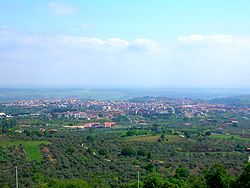Venosa
| Venosa | ||
|---|---|---|
| Comune | ||
| Città di Venosa | ||
 |
||
|
||
| Location of Venosa in Italy | ||
| Coordinates: 40°57′42.37″N 15°48′53.23″E / 40.9617694°N 15.8147861°ECoordinates: 40°57′42.37″N 15°48′53.23″E / 40.9617694°N 15.8147861°E | ||
| Country | Italy | |
| Region | Basilicata | |
| Province / Metropolitan city | Potenza (PZ) | |
| Government | ||
| • Mayor | Tommaso Gammone | |
| Area | ||
| • Total | 170.39 km2 (65.79 sq mi) | |
| Elevation | 415 m (1,362 ft) | |
| Population (June 2015) | ||
| • Total | 11,893 | |
| • Density | 70/km2 (180/sq mi) | |
| Demonym(s) | Venosini | |
| Time zone | CET (UTC+1) | |
| • Summer (DST) | CEST (UTC+2) | |
| Postal code | 85029 | |
| Dialing code | 0972 | |
| Patron saint |
St Roch (formerly St Felix of Thibiuca) |
|
| Saint day | August 16 | |
| Website | Official website | |
Venosa is a town and comune in the province of Potenza, in the southern Italian region of Basilicata, in the Vulture area. It is bounded by the comuni of Barile, Ginestra, Lavello, Maschito, Montemilone, Palazzo San Gervasio, Rapolla and Spinazzola.
The city was known as Venusia ("City of Venus") to the Romans, who credited its establishment—as Aphrodisia ("City of Aphrodite")—to the Homeric hero Diomedes. He was said to have moved to Magna Graeca in southern Italy following the Trojan War, seeking a life of peace and building the town and its temples to appease the anger of Aphrodite for the destruction of her beloved Troy.
The town was taken by the Romans after the Third Samnite War in 291 BC and became a colony. No fewer than 20,000 men were sent there, owing to its military importance. Throughout the Hannibalic wars it remained faithful to Rome, and had a further contingent of colonists sent in 200 BC to replace its losses in war. In 190 BC the Appian way was extended to the town. Some coins of Venusia of this period exist. It took part in the Social War, and was recaptured by Quintus Metellus Pius; it then became a municipium, but in 43 BC its territory was assigned to the veterans of the triumvirs, and it became a colony once more. Horace was born here in 65 BC. It remained an important place under the Empire as a station on the Via Appia, though Theodor Mommsen's description of it as having branch roads to Aequum Tuticum and Potentia
...
Wikipedia


